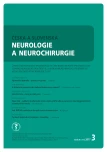-
Medical journals
- Career
Pyridoxine-dependent Epilepsy – Case Reports
Authors: Š. Aulická 1; L. Fajkusová 2; P. Šilerová 2; L. Elstnerová 3; T. Jimramovský 3; E. Dortová 4; H. Ošlejšková 1
Authors‘ workplace: Centrum pro epilepsie Brno, Klinika dětské neurologie LF MU a FN Brno 1; Centrum molekulární biologie a genové terapie, Interní hematoonkologická klinika LF MU a FN Brno 2; Pediatrická klinika LF MU a FN Brno 3; Neonatologické oddělení, FN Plzeň 4
Published in: Cesk Slov Neurol N 2017; 80/113(3): 346-349
Category: Case Report
doi: https://doi.org/10.14735/amcsnn2017346Tento projekt byl podpořen Lékařskou fakultou Masarykovy Univerzity (číslo grantu ROZV/ 24/ / LF/ 2016).
Overview
Pyridoxine-dependent epilepsy is a rare autosomal recessive hereditary disorder causing severe intractable epileptic seizures presenting typically in prenatal and neonatal period, rarely in early infancy (age up to 3 years). Pyridoxine-dependent epilepsy, caused by metabolic disturbance of pyridoxine, is associated with mutations in the ALDH7A1 or ALDH4A1 gene. Pyridoxine-dependent epilepsy is successfully treatable using high doses of pyridoxine. The diagnosis is based on biochemical and genetic examinations. Three case reports of patients with a typical clinical course of pyridoxine-dependent epilepsy and genetically detected mutation in the ALDH7A1 gene are presented.
Key words:
pyridoxine – pyridoxal-phosphate – pyridoxine-dependent epilepsy – pyridoxine-dependent seizures
The authors declare they have no potential conflicts of interest concerning drugs, products, or services used in the study.
The Editorial Board declares that the manuscript met the ICMJE “uniform requirements” for biomedical papers.
Chinese summary - 摘要
吡哆素依赖性癫痫 - 病例报告
吡哆素依赖性癫痫是一种罕见的常染色体隐性遗传性疾病,导致严重顽固性癫痫发作,典型地出现在产前和新生儿期,很少在婴儿期(3岁以下)。 由吡哆醇代谢紊乱引起的吡哆素依赖性癫痫与ALDH7A1或ALDH4A1基因突变有关。 吡哆素依赖性癫痫可以使用高剂量的吡哆醇成功治疗。 诊断是基于生物化学和遗传学检查。 介绍了典型的吡哆醇依赖性癫痫临床病程和ALDH7A1基因遗传检测突变患者的病例报告。
关键词:
吡哆醇 - 吡哆醛 - 磷酸 - 吡哆素依赖性癫痫 - 吡哆醇依赖性癫痫发作
Sources
1. Parish A, Nissen MD, O’Neil C, et al. Vitamin B 6 Dependency Syndromes. eMedicine Paediatrics 2008. [accessed 2017 20 Mar]. Available from URL: http://emedicine.medscape.com/article/985667-overview.
2. Rusnáková Š, Fajkusová L, Jansová E, et al. Pyridoxin dependentní epilepsie – nové trendy v diagnostice a terapii. Neurol Praxi 2010;11(5):322 – 5.
3. Gospe SM. Pyridoxine-dependent seizures: new genetic and biochemical clues to help with diagnosis and treatment. Curr Opin Neurol 2006;19(2):148 – 53.
4. Plecko B, Paul K, Paschke E, et al. Bio chemical and molecular characterization of 18 patients with pyridoxine-dependent epilepsy and mutations of the antiquitin (ALDH7A1) gene. Hum Mutat 2007;28(1):9 – 26.
5. Baxter P. Pyridoxine-dependent seizures: a clinical and biochemical conundrum. Biochim Biophys Acta 2003;1647(1 – 2):36 – 41.
6. Farrant RD, Walker V, Mills GA, et al. Pyridoxal phosphate de-activation by pyrroline-5-carboxylic acid. Increased risk of vitamin B6 deficiency and seizures in hyperprolinemia type II. J Biol Chem 2001;276(18):15107 – 16.
Labels
Paediatric neurology Neurosurgery Neurology
Article was published inCzech and Slovak Neurology and Neurosurgery

2017 Issue 3-
All articles in this issue
- Low Back Pain – Evidence-based Medicine and Current Clinical Practice. Is there Any Reason to Change Anything?
- Results of Endocrine Function after Transsphenoidal Surgery for Non-functional Pituitary Macroadenomas
- Radiological Findings in Term-neonates with Hypoxic-ischemic Encephalopathy
- Token Test – Validation Study in Older Czech Adults and Patients with Neurodegenerative Diseases
- Measurement of Malingering – Coin in the Hand Test
- Effects of Targeted Orofacial Rehabilitation in Patients after Stroke with Speech Disorders
- Diffusion Tensor Imaging in Patients with Idiopathic Normal Pressure Hydrocephalus
- Anti-NMDAR Antibodies in Demyelinating Diseases
- Pyridoxine-dependent Epilepsy – Case Reports
- Classification of Central Nervous System Tumors – WHO 2016 Update
- Quality of Life in Self-sufficient Patients after Stroke
- Myotonic Dystrophy – Unity in Diversity
- Febrile Seizures – Sometimes Less is More
- Fetal Radiation Risk Due to X-ray Procedures Performed on Pregnant Women
- Successful Treatment of Meningoencephalitis due to Cryptococcus gattii with Ommaya Reservoir and Intrathecal Injection of Amphotericin B – a Case Report
- Differential Diagnosis of Bithalamic and Pallidal Hypointensity – a Case of HEXB Mutation
- Significant Brain Oedema in Unruptured Brain Arteriovenous Malformation – a Case Report
- Czech and Slovak Neurology and Neurosurgery
- Journal archive
- Current issue
- Online only
- About the journal
Most read in this issue- Myotonic Dystrophy – Unity in Diversity
- Fetal Radiation Risk Due to X-ray Procedures Performed on Pregnant Women
- Low Back Pain – Evidence-based Medicine and Current Clinical Practice. Is there Any Reason to Change Anything?
- Febrile Seizures – Sometimes Less is More
Login#ADS_BOTTOM_SCRIPTS#Forgotten passwordEnter the email address that you registered with. We will send you instructions on how to set a new password.
- Career

